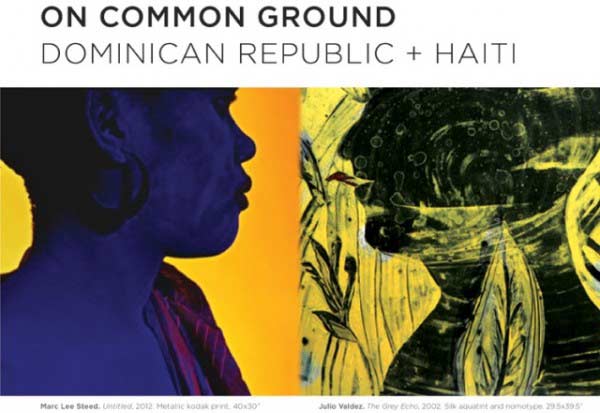On Common Ground: Haiti and the Dominican Republic
 The Art Museum of the Americas (operated by the Organization of American States) is hosting an exhibit entitled “On Common Ground: The Dominican Republic and Haiti.” The most interesting aspect of the exhibition is actually the commentary by the Dominican and Haitian artists. It is refreshing to hear Dominicans and Haitians elevate what they have in common, including a love of art and music. Each country would benefit from cultural exchanges with its neighbor. More from the artists follows:
The Art Museum of the Americas (operated by the Organization of American States) is hosting an exhibit entitled “On Common Ground: The Dominican Republic and Haiti.” The most interesting aspect of the exhibition is actually the commentary by the Dominican and Haitian artists. It is refreshing to hear Dominicans and Haitians elevate what they have in common, including a love of art and music. Each country would benefit from cultural exchanges with its neighbor. More from the artists follows:
Q. What comes to mind when you hear “Dominican Republic/Haiti?”
A. “There’s enough for both.” Engel Leonardo (Dominican Republic)
A. “The Dominican Republic and Haiti are twins. We’re born from the same blood. We don’t have the same culture nor the same wealth. Cultural exchanges should happen between us but don’t.” Killy (Haiti)
A. “One Island, Friendship, and Music.” Gustavo Pena (Dominican Republic)
A. “Incomprehension.” Pascale Monnin (Haiti)
A. “Unification: One Love and One Future.” Hulda Guzman (DR)
Q. What do you love most about your neighbor?
A. “Their trees.” Pascale Monnin (Haiti)
A. “Their desire to always move forward and their ability to survive and endure everything that is happening to them.” Julio Valdez (Dominican Republic)
A. “They are a neighbor that I don’t know very well.” Marc Steed (Haiti)
A. “I like the way that they dress so expressively and the way they use colors so playfully.” Gustavo Pena (Dominican Republic)
A. “Without having been to the Dominican Republic, from what I can hear on the radio, their development seems to be more advanced than ours.” Jean Emmanuel (Haiti)
A. “I really like the Haitian crafts, their music is unbelievable. I love their friendliness, having them around, and their culture in general.” Natalia Ortega (Dominican Republic)
Q. Why do you feel your country is misunderstood?
A. “Lack of responsibility.” Engel Leonardo (Dominican Republic)
A. “Is Haiti misunderstood?” Marc Steed (Haiti)
A. “Perhaps because we are extremely Caribbean and therefore relaxed.” Natalie Ortega (Dominican Republic)
A. “Misunderstood by whom?” Manuel Matthieu (Haiti)
A. “I don’t.” Hulda Guzman (Dominican Republic)
A. “The omnipresence of negative stories in the media.” Pascale Monnin (Haiti)
Q. What’s Your State of Mind?
A. “I am a troubled soul, especially in Haiti. My mind is like a crazy monkey, swinging left, swinging right. These preoccupations fuel my inspiration to create.” Killy (Haiti)
A. “Transition. Evolution. Change.” Engel Leonardo (Dominican Republic)
A. “Wanting Haiti to get on the right track after the earthquake.” Marc Steed (Haiti)
A. “I’m searching for economical designs.” Hulda Guzman (Dominican Republic)
A. “My state of mind is at ease when I hear that all kids can go to school, eat, find health care, water, and houses to sleep in. My mind is uneasy when people’s human rights are not respected. My mind will be at peace when justice for all is the norm.” Jean Emmanuel (Haiti)
A. “I’m thinking about the answers to your questions. In other words, I’m listening to my internal noises and organizing them.” Julio Valdez (Dominican Republic)
Q. What motivates you to create?
A.”Beautiful, positive images motivate me in my paintings. I like to depict my country for a better Haiti.” Jean Emmanuel (Haiti)
A. “Life.” Engel Leonardo (Dominican Republic)
A. “I don’t believe its motivation. It is more of a need. The need to discover.” Manuel Mathieu (Haiti)
A. “Disquietedness.” Pascale Monnin (Haiti)
A. “The need to approach the mystery of image and likeness and become the free co-creator with the sense of wonder that makes us human.” Julio Valdez (Dominican Republic)
Q. What’s your biggest fear?
A. “The mediocre mind and conformity. Also, tsunamis.” Natalie Ortega (DR)
A. “When I come across dead bodies, I fear for my life. Foreigners, tourists, and I should not be scared. But because of insecurity we are forced to be.” Jean Emmanuel (Haiti)
A. “I am completely fearless.” Hulda Guzman (Dominican Republic)
A. “One of them is to live someone else’s life.” Manuel Matthieu (Haiti)
A. “Every day I double-check to see if I lost my pen.” Gustavo Pena (Dominican Republic
A. “That Haiti is misunderstood.” Mark Steed (Haiti)
A. “Not being able to have the freedom to create and live fully in the time period that I am alive.” Julio Valdez (Dominican Republic)
AMA ׀ Art Museum of the Americas
201 18th Street, NW Washington, DC 20006
On View: February 13 - May 26, 2013
Add new comment